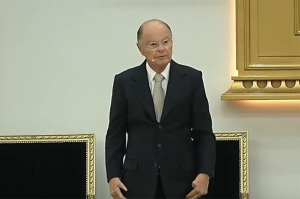5 Birth Control Mandate Myths
In the debate over the Obama administration's birth control mandate, there has been much misinformation. Here are five common myths regarding what the mandate does and does not do.
Myth #1: It only affects Catholics
Since the Catholic Church is the only prominent Christian denomination which doctrinally proscribes contraceptives and sterilization, some have assumed that the issue only affects the Catholic Church. The mandate also requires, however, that employers, including most religious employers, provide coverage for some abortion-inducing drugs. Many non-Catholic religious employers also oppose the use of these drugs, but would be required to pay for coverage under the mandate.
Additionally, many non-Catholic religious institutions worry that infringements upon the religious freedom of Catholics could set a precedent for infringing upon their religious freedom.
In December, 61 non-Catholic faith leaders sent a letter to President Obama to emphasize that the birth control mandate issue is not just a Catholic issue, and that they stand in solidarity with their Catholic brethren.
Myth #2: If the Catholic Church did not accept government funding for social services, it would not be an issue
The mandate is required of all employers – public and private, religious and secular – regardless of whether they take government money or not. (The only exceptions are those that meet the narrow religious exemption. See myth #4.) So, even if all Catholic institutions were to stop applying for grants to provide public services, they would still be required to abide by the mandate.
Myth #3: The issue is about access to birth control
Having access to a product is not the same as being required to purchase insurance that provides that product at no additional charge or co-pay. The U.S. Supreme Court ruled that laws banning contraception are unconstitutional in Griswold v. Connecticut (1965). Whether or not the birth control mandate goes into effect, Americans' access to birth control would not change. The only change would be how Americans pay for it – through higher insurance premiums (and perhaps reduced salary), rather than at the drug store or doctor's office.
Myth #4: Since there is a religious exemption, religious freedom is not an issue
One of the primary complaints of those opposed to the birth control mandate is that the religious exemption itself violates the principles of religious freedom. Only organizations that primarily serve coreligionists and whose primary purpose is the inculcation of religious beliefs can receive an exemption.
Religious organizations that are primarily engaged in public service, such as drug rehab, feeding the hungry or helping former prisoners, are not considered a religion and, thus, not entitled to First Amendment religious freedom protections. The government, therefore, is telling religious groups what constitutes a religious activity. For many religions, public service is part of their doctrine. Religion is not simply confined to Sunday morning worship. Helping the poor and vulnerable is a central component of many faiths.
The narrowly written religious exemption implies a narrow understanding, by the Obama administration of which institutions it believes are protected by the religious freedom clauses of the First Amendment.
Myth #5: President Obama made accommodations to address these concerns, so the controversy is over
In a February 10 speech, Obama announced a change to the birth control mandate. Religious employers would not be required to purchase health insurance with birth control coverage for their employees, but the insurance company must contact those employees and offer to provide the coverage without a co-pay or increased premium.
The position satiated many Democrats who had grown anxious about the mandate, such as Washington Post columnist E.J. Dionne and Senators Bob Casey, Jr. (Pa.), John Kerry (Mass.), and Jim Webb (Va.). However, those most concerned about the mandate, such as the U.S. Conference of Catholic Bishops, World Vision, and the Institutional Religious Freedom Alliance, have argued that Obama's proposed changes do not constitute a genuine compromise. There have been five main objections.
First, the proposal makes no changes to the narrowly defined religious exemption, which has offended many. Second, if insurance companies must offer the services at no additional charge, religious groups worry they will end up paying for the coverage anyway through higher premiums. Third, since the employees of religious groups would be contacted by the insurance company and offered the coverage as a result of not having the coverage through the employer, some religious groups feel that would still make them complicit in actions their doctrine forbids. Fourth, religious groups that self-insure would still be bound by the mandate because they themselves are the insurance company. And fifth, Obama's February 10 speech remains, alas, just a speech. There has been no executive order codifying his proposals.





























